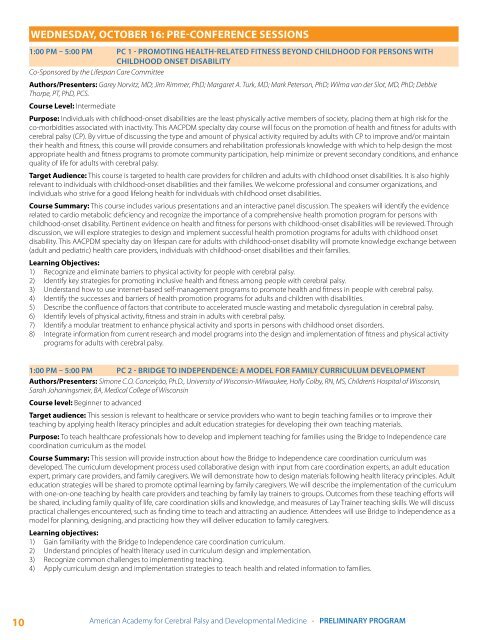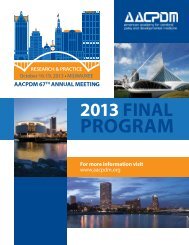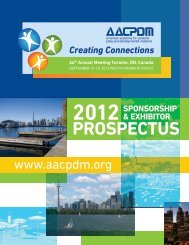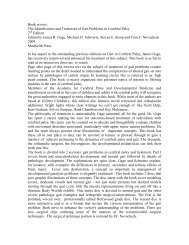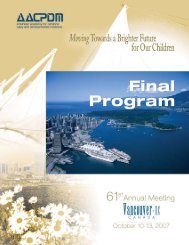program - American Academy for Cerebral Palsy and ...
program - American Academy for Cerebral Palsy and ...
program - American Academy for Cerebral Palsy and ...
Create successful ePaper yourself
Turn your PDF publications into a flip-book with our unique Google optimized e-Paper software.
Wednesday, October 16: Pre-Conference Sessions<br />
1:00 pm – 5:00 pm PC 1 - Promoting health-related fitness beyond childhood <strong>for</strong> persons with<br />
childhood onset disability<br />
Co-Sponsored by the Lifespan Care Committee<br />
Authors/Presenters: Garey Norvitz, MD; Jim Rimmer, PhD; Margaret A. Turk, MD; Mark Peterson, PhD; Wilma van der Slot, MD, PhD; Debbie<br />
Thorpe, PT, PhD, PCS.<br />
Course Level: Intermediate<br />
Purpose: Individuals with childhood-onset disabilities are the least physically active members of society, placing them at high risk <strong>for</strong> the<br />
co-morbidities associated with inactivity. This AACPDM specialty day course will focus on the promotion of health <strong>and</strong> fitness <strong>for</strong> adults with<br />
cerebral palsy (CP). By virtue of discussing the type <strong>and</strong> amount of physical activity required by adults with CP to improve <strong>and</strong>/or maintain<br />
their health <strong>and</strong> fitness, this course will provide consumers <strong>and</strong> rehabilitation professionals knowledge with which to help design the most<br />
appropriate health <strong>and</strong> fitness <strong>program</strong>s to promote community participation, help minimize or prevent secondary conditions, <strong>and</strong> enhance<br />
quality of life <strong>for</strong> adults with cerebral palsy.<br />
Target Audience: This course is targeted to health care providers <strong>for</strong> children <strong>and</strong> adults with childhood onset disabilities. It is also highly<br />
relevant to individuals with childhood-onset disabilities <strong>and</strong> their families. We welcome professional <strong>and</strong> consumer organizations, <strong>and</strong><br />
individuals who strive <strong>for</strong> a good lifelong health <strong>for</strong> individuals with childhood onset disabilities.<br />
Course Summary: This course includes various presentations <strong>and</strong> an interactive panel discussion. The speakers will identify the evidence<br />
related to cardio metabolic deficiency <strong>and</strong> recognize the importance of a comprehensive health promotion <strong>program</strong> <strong>for</strong> persons with<br />
childhood-onset disability. Pertinent evidence on health <strong>and</strong> fitness <strong>for</strong> persons with childhood-onset disabilities will be reviewed. Through<br />
discussion, we will explore strategies to design <strong>and</strong> implement successful health promotion <strong>program</strong>s <strong>for</strong> adults with childhood onset<br />
disability. This AACPDM specialty day on lifespan care <strong>for</strong> adults with childhood-onset disability will promote knowledge exchange between<br />
(adult <strong>and</strong> pediatric) health care providers, individuals with childhood-onset disabilities <strong>and</strong> their families.<br />
Learning Objectives:<br />
1) Recognize <strong>and</strong> eliminate barriers to physical activity <strong>for</strong> people with cerebral palsy.<br />
2) Identify key strategies <strong>for</strong> promoting inclusive health <strong>and</strong> fitness among people with cerebral palsy.<br />
3) Underst<strong>and</strong> how to use internet-based self-management <strong>program</strong>s to promote health <strong>and</strong> fitness in people with cerebral palsy.<br />
4) Identify the successes <strong>and</strong> barriers of health promotion <strong>program</strong>s <strong>for</strong> adults <strong>and</strong> children with disabilities.<br />
5) Describe the confluence of factors that contribute to accelerated muscle wasting <strong>and</strong> metabolic dysregulation in cerebral palsy.<br />
6) Identify levels of physical activity, fitness <strong>and</strong> strain in adults with cerebral palsy.<br />
7) Identify a modular treatment to enhance physical activity <strong>and</strong> sports in persons with childhood onset disorders.<br />
8) Integrate in<strong>for</strong>mation from current research <strong>and</strong> model <strong>program</strong>s into the design <strong>and</strong> implementation of fitness <strong>and</strong> physical activity<br />
<strong>program</strong>s <strong>for</strong> adults with cerebral palsy.<br />
1:00 pm – 5:00 pm PC 2 - Bridge to Independence: A model <strong>for</strong> family curriculum development<br />
Authors/Presenters: Simone C.O. Conceição, Ph.D., University of Wisconsin-Milwaukee, Holly Colby, RN, MS, Children’s Hospital of Wisconsin,<br />
Sarah Johaningsmeir, BA, Medical College of Wisconsin<br />
Course level: Beginner to advanced<br />
Target audience: This session is relevant to healthcare or service providers who want to begin teaching families or to improve their<br />
teaching by applying health literacy principles <strong>and</strong> adult education strategies <strong>for</strong> developing their own teaching materials.<br />
Purpose: To teach healthcare professionals how to develop <strong>and</strong> implement teaching <strong>for</strong> families using the Bridge to Independence care<br />
coordination curriculum as the model.<br />
Course Summary: This session will provide instruction about how the Bridge to Independence care coordination curriculum was<br />
developed. The curriculum development process used collaborative design with input from care coordination experts, an adult education<br />
expert, primary care providers, <strong>and</strong> family caregivers. We will demonstrate how to design materials following health literacy principles. Adult<br />
education strategies will be shared to promote optimal learning by family caregivers. We will describe the implementation of the curriculum<br />
with one-on-one teaching by health care providers <strong>and</strong> teaching by family lay trainers to groups. Outcomes from these teaching ef<strong>for</strong>ts will<br />
be shared, including family quality of life, care coordination skills <strong>and</strong> knowledge, <strong>and</strong> measures of Lay Trainer teaching skills. We will discuss<br />
practical challenges encountered, such as finding time to teach <strong>and</strong> attracting an audience. Attendees will use Bridge to Independence as a<br />
model <strong>for</strong> planning, designing, <strong>and</strong> practicing how they will deliver education to family caregivers.<br />
Learning objectives:<br />
1) Gain familiarity with the Bridge to Independence care coordination curriculum.<br />
2) Underst<strong>and</strong> principles of health literacy used in curriculum design <strong>and</strong> implementation.<br />
3) Recognize common challenges to implementing teaching.<br />
4) Apply curriculum design <strong>and</strong> implementation strategies to teach health <strong>and</strong> related in<strong>for</strong>mation to families.<br />
10<br />
<strong>American</strong> <strong>Academy</strong> <strong>for</strong> <strong>Cerebral</strong> <strong>Palsy</strong> <strong>and</strong> Developmental Medicine • PRELIMINARY PROGRAM


